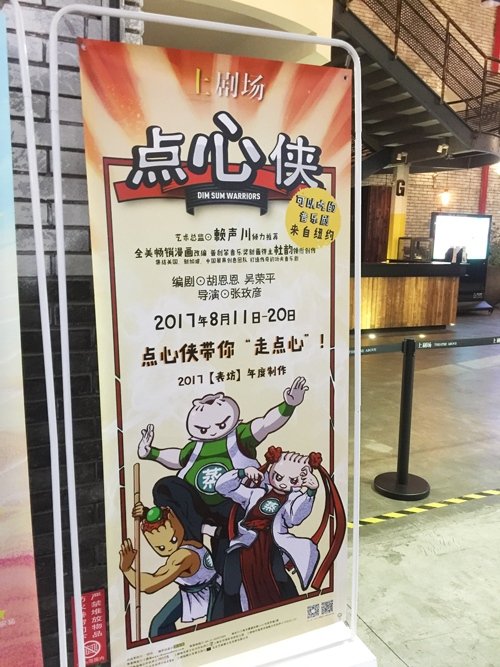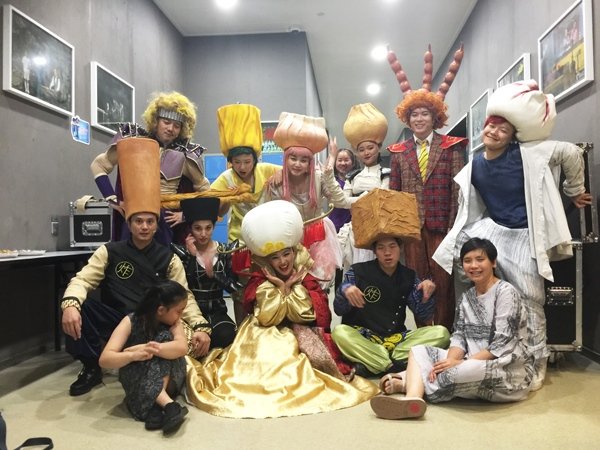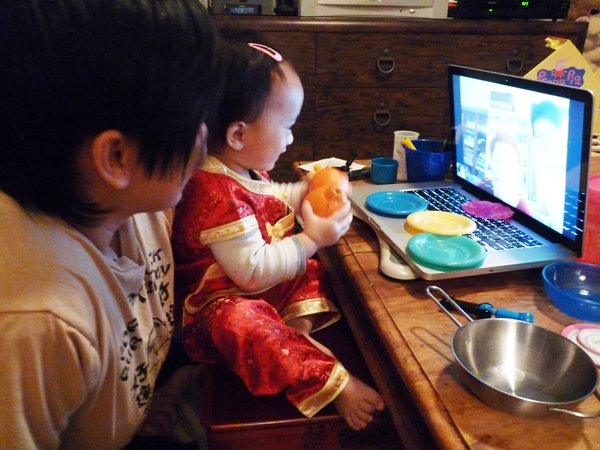Experience the Target Language as Dynamic and Creative
Eventually a few fortuitous things happened to us.
When our daughter YB (short for “Yakuza Baby”, a nickname we gave her when she arrived while we were watching a Japanese gangster movie) was 7 years old, we were invited to adapt Dim Sum Warriors as a stage musical in Shanghai.
So we had to move to Shanghai for the 3-month development and rehearsal period. While we worked, she wandered around the theatre like the troupe’s resident cat.
She also made friends with the daughter of another director who was working on a separate play at the same theatre. Yakuza Baby could only speak some very basic Chinese, and her friend only a little English. But making a new friend was such a strong incentive that YB began communicating with the girl using Google Translate on Colin’s phone. It worked well enough, and the two were inseparable despite the language gulf.
The young actors also played with YB during breaks. From these interactions, YB picked up a significant amount of Chinese vocabulary, but more than that, she got to see and experience Chinese not as a subject to be studied in school, but as a language that was alive and which was used to create art.


The musical was an important shift in YB’s relationship with the Chinese language. In New York, speaking Chinese didn’t offer her greater access to people or stories—whereas in Shanghai, it did.
YB felt her own lack of Chinese acutely, and saw that if she only had more ability in the language, she would be able to participate in a whole different cultural conversation that was exciting and dynamic.

Of course, spending an extended period in China and mounting a Chinese musical isn’t the most replicable experience.
But the takeaway is that we can all CHANGE THE FRAME FOR SEEING THE LANGUAGE.
In the process of trying to teach your children a new language, try to give them opportunities to interact with people who create cool things in the language… even if they are not formally teaching the language per se.
This re-framing of a language as a tool for expressing ideas and creativity goes A VERY LONG WAY in sustaining a child’s motivation in learning the language, and for also making sure that kids don’t fear it.
We were so struck by how quickly YB’s Chinese had progressed in those 3 short months that when I got invited to be a Visiting Professor at Taiwan’s National Central University after the musical wrapped, I immediately said yes—because I saw it as a great opportunity to make up for all the years of not learning Chinese properly.
It was not an easy move, though, especially for poor YB. Although she could now speak more, she couldn’t read or write Chinese. And starting from zero in a completely Chinese environment?
I’ll write in greater detail about this move and its impact in a future post. In the meantime, you can watch this lecture I gave about our experience at the Singapore Ministry of Education’s Mother Tongue Languages Symposium.
Again, we know it isn’t feasible for everyone to move to a different, immersive environment like we did.
But I have condensed the processes I learned through our experiences—as well as through meeting many passionate and smart Chinese teachers—into an accessible learning system that can help other families trying to raise truly bilingual and multiliterate kids.
That system is the Dim Sum Warriors Club, which we are very excited to share with you!
If you have any questions or topics that you would like me to cover in the areas of education and parenting, please send me an email at yenyen@dimsumwarriors.com. I check all my emails personally and look forward to your questions. However, if you’re a student who’s trying to ask me to do your homework or project for you, I will most likely not have time to respond because I get way too many of those emails and it’s quite impossible to answer them all.
I also host The Dim Sum Warriors Doodle Date together with my co- creator and cartoonist Colin Goh two times a month. This is a FREE bilingual chat-and-draw-along session run via Facebook on select Saturdays at 10.30 am (Singapore time (UTC+8). If you are interested, check out this introduction to Dim Sum Warriors.

